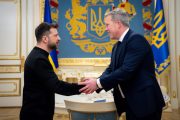
NATO countries are increasing their production of artillery munitions as Ukraine is consuming shells much faster than the West can make them, the alliance declared on February 15 amid promises to supply at least 48 German Leopard 2 tanks to Kyiv.
“Things are happening, but … we need to step up even more, because there is a big need out there to provide Ukraine with ammunition,” NATO chief Jens Stoltenberg told reporters after a two-day meeting of alliance defense ministers in Brussels.
He noted countries such as the United States, France, Germany, and Norway had inked contracts for munitions that would empower NATO members to replenish their own stocks but also continue to offer Kyiv supplies. Even prior to the onset of the Ukraine conflict in February last year, many NATO countries did not achieve their own munitions-stockpiling targets.
Moreover, the pace of deliveries to Ukraine, where Kyiv’s troops are firing up to 10,000 artillery shells daily, has put a further strain on Western inventories.
Simultaneously, plans to offer Kyiv with two battalions of Leopard 2 tanks are underway.
German Defense Minister Boris Pistorius said Western nations had pledged 48 Leopard II tanks for Kyiv, including one battalion of 31 older Leopard 2 A4 tanks whose delivery is being overseen by Poland.
Additionally, Berlin is slated to deploy 14 and Lisbon another three of the more advanced Leopard 2 A6 tanks, said Pistorius.
Besides, allies started talks on whether defense expenditures of two percent of gross domestic product are sufficient with a full-fledged conflict in Ukraine.
“I think we should move from regarding the 2 percent as a ceiling, to regarding the 2 percent of GDP as a floor, as a minimum,” said Stoltenberg, whose remarks were backed by Pistorius.
“I think moving towards the 2 per cent target alone will not be enough; it can only be the basis for further steps,” the German defense minister told reporters.
A decision is anticipated to be made at a NATO summit in Lithuania in July.
At their Wales summit in 2014, NATO leaders agreed to move toward spending at least two percent of their gross domestic product on defense within a decade. In 2022, Berlin’s defense expenditures were anticipated to reach less than 1.5 percent of GDP, while the United States was spending almost 3.5 percent, based on NATO figures published last June.
Meanwhile, Ukrainian Defense Minister Oleksii Reznikov said on February 15 that he was “absolutely” confident Western countries will provide fighter jets to Kyiv to counter the Russians.
In an interview with Reuters in Brussels, Reznikov pointed out that Ukraine’s allies had eventually supplied a range of Western weapons systems after initially stating they would not do so. “Impossible became possible,” he declared.
He claimed fighter jets were necessary as part of a broader system of air defenses to shield Ukraine.
Reznikov admitted that personally he thought that U.S. F-16s would be best, as they are used by a wide range of countries. “My dream: it should be an F-16. But [the Swedish] Gripen also is very good,” he said.
Having obtained a range of Western weapons including air defense systems, rockets, artillery, and tanks, Reznikov even said he had joked with Western ministers that fighter jets were the final item on his wish list to Santa Claus.
Reznikov said air defense was Ukraine’s top priority in terms of military help, although Kyiv has already received multiple advanced systems. He said that if Russia launched any major attacks, Ukraine would mobilize its own air force more.
“If they start a real offensive campaign, certainly they will use aircraft from their side, trying to stop our defense forces. That means it’s a real threat, that’s why we need more sophisticated, more modern aircraft — to stop them, to defeat them, to deter them.”
While many mainstream media reports typically paint the West in a more benevolent light than the Russians, Russian state media Sputnik News cited Russian Foreign Ministry spokeswoman Maria Zakharova as saying that the very statement of U.S. Under Secretary of State for Political Affairs Victoria Nuland about the strikes on Crimea verified U.S. involvement in the Ukraine conflict.
Previously, Nuland had said that Ukraine will not be considered safe by the collective West unless Crimea is demilitarized at the very least, and that the United States backs Kyiv targeting massive Russian military installations in Crimea as it deems them to be legitimate targets.
“She [Nuland] allowed herself a whole series of mind-blowing and absurd statements…. Once again, we see the involvement of the United States in the conflict in Ukraine — supplying weapons in huge quantities, providing intelligence, and blatantly participating in combat operations planning,” Zakharova said at a briefing. She added, “I would like to give Victoria Nuland a piece of advice — take care of white balloons and UFOs that are flying above the territory of the US. As we can see, you are not very successful in dealing with these unidentified objects quickly and efficiently. Your people are being mocked at, while you are dreaming of Russia’s defeat and now even urging Kyiv to attack Crimea. You have things to do back home.”
Also, former Italian Prime Minister Silvio Berlusconi, who leads the Forza Italia party, a junior partner in Giorgia Meloni’s new three-party, center-right governing coalition, criticized the leadership in Kyiv for the longstanding conflict in Ukraine. Berlusconi ruffled feathers in the pro-Ukraine camp when he blamed Ukrainian President Volodymyr Zelensky for the Russo-Ukrainian conflict.
In his statements, which came on February 13 to the Italian press, the Forza Italia leader criticized Prime Minister Giorgia Meloni’s talk with Zelensky as “inappropriate,” and said, among other things, that the conflict would not have happened if Zelensky had ceased “attacking the two autonomous republics of Donbas,” according to Corriere Della Sera.
“If I were prime minister, I never would have met Zelensky because we are witnessing the devastation of his country and the slaughter of his soldiers and civilians,” Berlusconi asserted. “He only needed to stop bombing the autonomous republics of Donbas, and none of this would have happened. I have a very, very negative opinion of the behavior of this gentleman.”
Berlusconi went on to argue that in order to finally bring the conflict — which is soon approaching its one-year mark — to an end, U.S. President Joe Biden should say to Zelensky, “After the war is over, a Marshall Plan is at your disposal to rebuild Ukraine with six to seven or eight to nine trillion dollars on one condition — that you order a ceasefire tomorrow, also because starting tomorrow we will no longer give you dollars and we will no longer give you weapons.”
Berlusconi elaborated by stating that “only something like this could convince this gentleman to arrive at a ceasefire.”
His comments contradicted statements issued by Meloni’s office later that evening, where she maintained the Italian government’s support for Ukraine, writing, “The Italian government’s support for Ukraine is firm and convinced, as clearly stated in the program and as confirmed in all parliamentary votes of the majority supporting the Executive.”
Capitalizing on the situation, Partito Democratico (PD), Italy’s primary left-wing opposition party, tried to undermine the incumbent ruling center-right coalition.
“Does Giorgia Meloni agree with the disturbing words uttered by Berlusconi?” asked Senate group leader Simona Malpezzi (PD), elaborating: “With these government allies, the premier should not complain about how she is treated in the EU.”
It remains unclear how Berlusconi’s controversial remarks would influence the unity of Italy’s governing center-right coalition.
However, what is clear is that his comments provoked an outcry within the European People’s Party (EPP), the parliamentary grouping to which his party, Forza Italia, belongs. Based on a report from Politico Europe, which quotes two sources familiar with the grouping’s internal fray, politicians from nine countries have slammed Berlusconi’s remarks, with several reportedly threatening to boycott a center-right gathering slated to happen soon in Naples, Italy, if Berlusconi attends.
Yet, Foreign Minister Antonio Tajani, a member of Forza Italia, defended Berlusconi and praised him as a “man of peace.”
“He has certainly not changed his positions in support of Ukraine, Nato, and the West. We have always voted the same way and we will continue to vote that way. The government’s position is always the same,” Tajani said.
Similarly, Moscow reacted to the former Italian premier’s statements, with Zakharova stating, “It is not for me to judge and give Berlusconi votes, these are things that concern Italians. I just stick to the facts, and the facts say that for eight years, since 2014, Russia insisted that the Minsk agreements for peace in Ukraine be implemented. But this was not what the West had in mind.”




